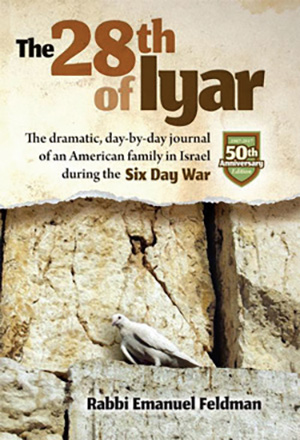
Reviewing: “The 28th of Iyar: The Dramatic, Day-by-Day Journal of an American Family in Israel During the Six-Day War,” by Rabbi Emanuel Feldman. Feldheim Publishers. Hardcover, 176 pages, 2017. ISBN-10: 1680252941.
In June of 1967, Rabbi Emanuel Feldman was nearing the end of a one-year teaching position at Bar Ilan University, soon to return to his home and congregation in Atlanta, Georgia, when Egypt closed the straits of Tiran, threatening Israel’s supplies, and soon, its existence. Rabbi Feldman began keeping a diary, tracking the growing apprehension in Israel, the disruption of daily life, and the hand-wringing of Americans in the country over whether to ride out the storm or flee while they could. His account, “The 28th of Iyar,” originally published by Feldheim in 1968, has been reissued this year to mark the 50th Anniversary of the Six-Day War.
The book is not an attempt at political or military analysis. It’s the story of everyday people who saw a sword coming down over their heads and how they lived with the knowledge. Rabbi Feldman lived in Bnei Brak and writes about how religious Jews prayed, talked and fought with allegiance to the state and to the ultimate commander above.
Rabbi Feldman paints a vivid picture of the times, with colorful anecdotes, sharply focused observation and honest self-examination, plus a good dash of humor. He captures a portrait of the people and culture of Israel, still emerging from the devastation of the Holocaust. Today we call Israel the start-up nation. Then, it was the catch-up nation. No TV. Periodic radio broadcasts. Tea at 10:00 a.m. and 3:00 p.m. no matter what urgent task needed doing.
Rabbi Feldman’s bemused description of winning over the menahel, director, of the post office will be heartwarming to anyone who has tried to make headway with bureaucrats. He volunteers to help deliver mail—he has a car and all the trucks have been conscripted by the army—and still is treated like a lowly employee, until he gains the menahel’s approval. He writes: “After returning from the swift completion of my appointed rounds, from which neither snow nor rain nor heat nor gloom of night nor Nasser stayed me, the post office menahel welcomed me with a broad smile, ushered me grandly into his office, waved me to a chair beside his desk, and offered me a hot glass of tea—with lemon and sugar. Tea inside the menahel’s office: Have I not arrived?”
On a more somber note, he writes about Carlebach’s book store, usually teeming with buyers and browsers, but now empty as war approached. He calls Carlebach “…a huge, jolly man, with a great scraggly beard. He has a sardonic sense of humor, a fine gift of irony, and I think he attracts people to his place by force of personality alone.” Rabbi Feldman contrasts that persona with the gloomy person in front of him. “He was sitting all alone there behind his table, the ubiquitous glass of tea untouched, a glazed look in his eyes as if he were viewing some far-away scene. Without looking at me he murmured in a monotone: ‘They just slaughtered us and killed us all a few years ago. We who were left—human rags—came here. For a little peace, a little rest. What do they want from us?’”
The Feldman family stays and war breaks out. His students have been called up to the army. He learns about bomb shelters, and how quickly you have to get into one. After one stint in a shelter with his wife and young children, he realizes that his older children are still at school.
“Do they have a shelter at school?” he asks his neighbors.
“Yes, yes, don’t worry, a fine shelter,” they say.
“Good. They have a fine shelter as school. Odd how grateful one can be for a simple thing like a fine shelter at school. Nice project for the next PTA meeting.”
An American student learning at the Ponevezh Yeshiva, who had become close to the family, came to visit and say goodbye—just in case. Rabbi Feldman asked him how it was going at the yeshiva.
“Everyone is down in the shelter and we are all studying down there. The Rosh Yeshiva has put us on a kind of twenty-four hour duty for the duration. He wants at least fifty boys studying at every minute of the day and night. You know Rav Kahaneman. He says that Torah study is the generator that will keep our men in the field going.”
When the victorious soldiers reach the Kotel, all are overcome with the need to pray and show their gratitude. “…There they stand, the gentle and fierce young soldiers of Israel at the Western Wall, the Wailing Wall, at the Temple Mount, near the Holy of Holies…swaying gently to and fro, caressing the stones, weeping without shame, and they shout ‘Shema Yisrael’ and the words reverberate along the Wall.”
“The 28th Day of Iyar” lets you feel like you’re living through this tumultuous time in Israel with the Feldmans. But you can enjoy the journey since you know it has a happy ending.
By Bracha Schwartz










